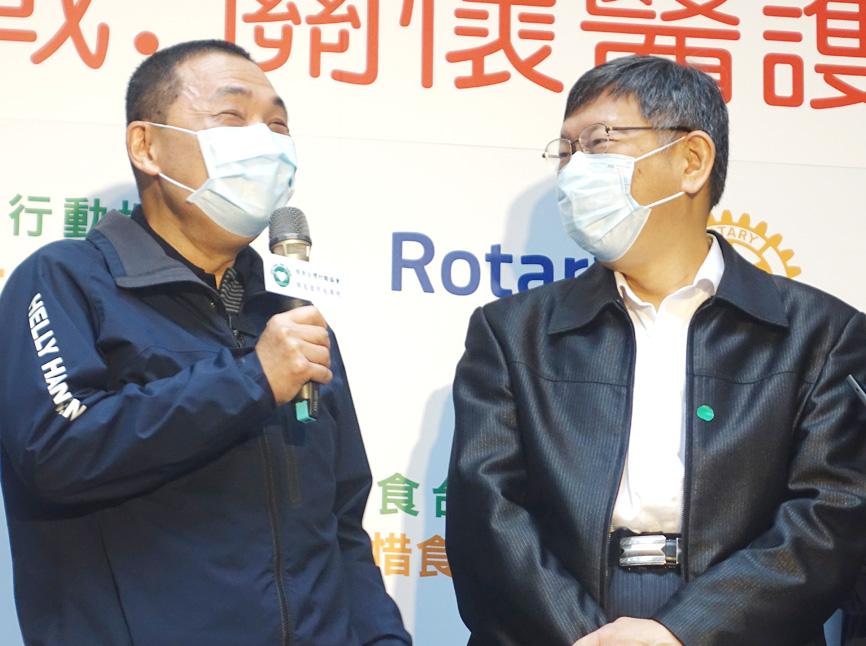Taipei Mayor Ko Wen-je (柯文哲) yesterday said that the disease prevention measures implemented in the next week would be critical in determining how the nation’s COVID-19 situation develops.
Ko made the remark on the sidelines of a launch event for Cherish Food Taiwan’s Cherish Food Kitchen, which is to provide 300 free hot boxed lunches each day to frontline healthcare professionals at seven hospitals in Taipei and New Taipei City.
The association said that it collects unconsumed ingredients to make the meals and gives them to elderly people who are in need.

Photo: Wang Yi-sung, Taipei Times
It established the new kitchen to expand its capacity during the COVID-19 outbreak and would provide meals to frontline medical professionals from Monday to Friday for three months, it said.
The seven hospitals are: New Taipei City Hospital’s Sanchong and Banciao branches, the Ministry of Health and Welfare’s Taipei Hospital and Shuang Ho Hospital, Taipei Municipal Wanfang Hospital, Shinkong Wu Ho-su Memorial Hospital, and Taipei City Hospital’s Chung Hsin Branch.
“In my opinion, the upcoming week is the most dangerous period [for Taiwan], as the reported cases have increased by about 20 every day,” he said. “If we can keep it under control and reduce the numbers, then we can pass the second wave [of imported cases], but if there is a loophole, the situation will be horrible.”
New Taipei City Mayor Hou You-yi (侯友宜) said that no one knows when the battle against COVID-19 will end, so everyone should play their part, like members of a baseball team.
In addition to cooperating with the central government, local governments must also cooperate, just as Taipei provided the building for the Cherish Food Kitchen and New Taipei City provided the ingredients, so that meals could be provided to hospitals in both cities, he said.

The manufacture of the remaining 28 M1A2T Abrams tanks Taiwan purchased from the US has recently been completed, and they are expected to be delivered within the next one to two months, a source said yesterday. The Ministry of National Defense is arranging cargo ships to transport the tanks to Taiwan as soon as possible, said the source, who is familiar with the matter. The estimated arrival time ranges from late this month to early next month, the source said. The 28 Abrams tanks make up the third and final batch of a total of 108 tanks, valued at about NT$40.5 billion

Two Taiwanese prosecutors were questioned by Chinese security personnel at their hotel during a trip to China’s Henan Province this month, the Mainland Affairs Council (MAC) said yesterday. The officers had personal information on the prosecutors, including “when they were assigned to their posts, their work locations and job titles,” MAC Deputy Minister and spokesman Liang Wen-chieh (梁文傑) said. On top of asking about their agencies and positions, the officers also questioned the prosecutors about the Cross-Strait Joint Crime-Fighting and Judicial Mutual Assistance Agreement, a pact that serves as the framework for Taiwan-China cooperation on combating crime and providing judicial assistance, Liang

A group from the Taiwanese Designers in Australia association yesterday represented Taiwan at the Midsumma Pride March in Melbourne. The march, held in the St. Kilda suburb, is the city’s largest LGBTQIA+ parade and the flagship event of the annual Midsumma Festival. It attracted more than 45,000 spectators who supported the 400 groups and 10,000 marchers that participated this year, the association said. Taiwanese Designers said they organized a team to march for Taiwan this year, joining politicians, government agencies, professionals and community organizations in showing support for LGBTQIA+ people and diverse communities. As the first country in Asia to legalize same-sex

MOTIVES QUESTIONED The PLA considers Xi’s policies toward Taiwan to be driven by personal considerations rather than military assessment, the Epoch Times reports Chinese President Xi Jinping’s (習近平) latest purge of the Chinese People’s Liberation Army (PLA) leadership might have been prompted by the military’s opposition to plans of invading Taiwan, the Epoch Times said. The Chinese military opposes waging war against Taiwan by a large consensus, putting it at odds with Xi’s vision, the Falun Gong-affiliated daily said in a report on Thursday, citing anonymous sources with insight into the PLA’s inner workings. The opposition is not the opinion of a few generals, but a widely shared view among the PLA cadre, the Epoch Times cited them as saying. “Chinese forces know full well that